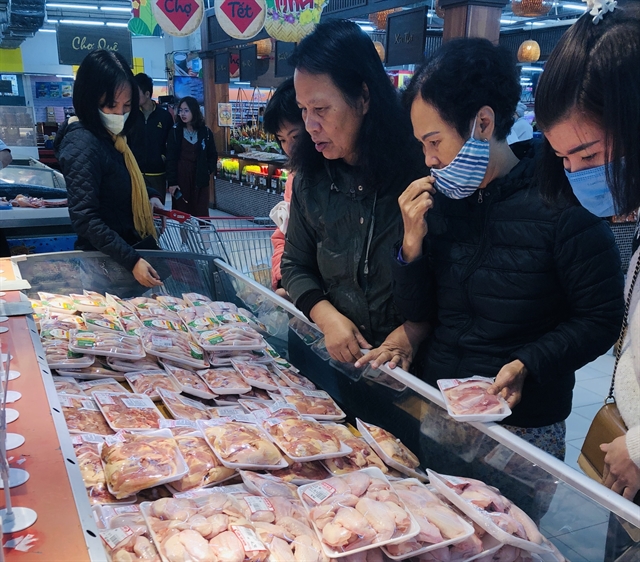The February consumer price index (CPI) slipped 0.17 per cent from the previous month due to falling demand for goods after the Lunar New Year (Tet) holiday, falling petrol prices, and the coronavirus (COVID-19) outbreak.

The February consumer price index (CPI) slipped 0.17 per cent from the previous month due to falling demand for goods after the Lunar New Year (Tet) holiday, falling petrol prices, and the coronavirus (COVID-19) outbreak, according to the General Statistics Office (GSO).
Among 11 groups of products and services in the CPI basket, a decline was recorded in six groups: transport service (2.5 per cent); culture, entertainment and tourism (0.43 per cent); beverage and tobacco (0.28 per cent); garment, head wear and footwear (0.13 per cent); housing and building material (0.03 per cent); and post and telecommunication services (0.05 per cent).
Five groups with higher prices were restaurant and catering service (0.26 per cent); other commodities and services (0.17 per cent); medicine and medical services (0.13 per cent); household appliances (0.08 per cent); and education (0.04 per cent).
HCM City saw a decrease of 0.18 per cent in its consumer price index in February compared with that of the previous month, the municipal Statistics Office reported.
Specifically, a decline was seen in four out of 11 commodity groups, including restaurant and catering service (0.18 per cent); beverage and tobacco (0.83 per cent); culture, entertainment and tourism (0.31 per cent); and transport (2.8 per cent).
Head of the GSO’s Price Statistics Department Do Thi Ngoc said that falling demands for goods after Tet made the prices of garment and textile, footwear, head wear, beverages and tobacco decrease.
She also said the decline in travel and festival activities due to the COVID-19 outbreak was behind the fall in prices of tourism, hotel and entertainment services.
In addition, prices of fresh and processed fruits dropped in the month as exports were impacted by close control at several border gates during the disease outbreak.
Ngoc added that petrol prices were adjusted down on February 14, contributing to a 0.22 per cent fall of the CPI.
Meanwhile, there were some factors helping curb the CPI downtrend, Ngoc said, noting that the COVID-19 outbreak since January pushed prices of medicine up 0.18 per cent from the previous month.
Demand for power and water rose 0.44 per cent and 0.64 per cent, respectively, in February as schools were closed and students stayed at home as a caution amid the COVID-19 threat, Ngoc stated, adding prices of vegetables also rose significantly in February due to shortage of supply caused by hail and rain in the north and saline intrusion in the Mekong Delta region.
In February, gold prices moved in tandem with global gold prices, surging 2.74 per cent from January to hover around VND4.45 million (US$192.12) per tael. Gold prices increased as investors move to invest in safer assets due to fear of a cloudy economic prospect caused by the COVID-19 outbreak.
The VND/USD exchange rate was kept stable, with one US dollar exchanged for VND23,300, thanks to abundant foreign currency reserves of the State Bank of Viet Nam.
The GSO said that core inflation (CPI excluding food items, energy products and commodities under the State management like medical and educational services) in February inched up 0.17 per cent from January, and 2.94 per cent from a year ago. The two-month core inflation climbed 3.1 per cent from the same period in 2019. — VNS





